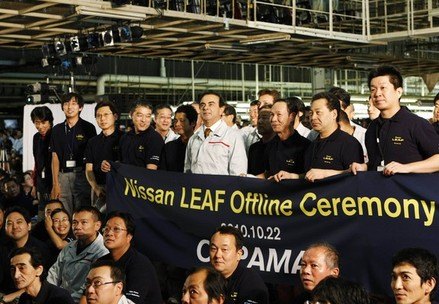Nissan Bets The Farm On A Leaf

Unimpressed by BYD’s aborting of the pure plug-in EV, Nissan is betting the farm on us plugging in instead of gassing up. A few days ago, Nissan officially introduced the Leaf, the world’s first mass-produced EV in the standard passenger class, seating five. It won’t totally replace the internal combustion engine, at least not at the plant where it is made.
When the Leaf went “offline” a few days ago (this is one of the many quirks in the industry: offline good, online bad), reporters had a chance to marvel at the engineering. The Nikkei [sub] reports that “Leaf assembly was taking place on the same line as Nissan’s popular Juke mini-SUV and other compacts. At the station where gasoline-powered cars receive their fuel tanks, the Leaf gets its lithium-ion battery pack, and at the engine-mounting station it receives its electric motor.” At the Nissan’s Oppama plant in Yokosuka, Kanagawa Prefecture, Leafs and other cars share the same line, all they needed was a special lift for the battery packs, which weigh several hundred kilograms.
Nissan has big plans for the Leaf. Using the Oppama principle to build various models on the same line simultaneously, Nissan will start mass-producing the Leaf at its Smyrna Plant in the U.S. in late 2012 and at its Sunderland Plant in the U.K. in early 2013. Once that is all in motion, Nissan will have an annual capacity of 250,000 EVs worldwide.
The also will produce lots of batteries, and they hope to “gradually compress the cost of mass-producing batteries by having both Nissan and Renault produce EVs,” said Corporate Vice President Hideaki Watanabe.
Nissan’s dream? To become for EVs what Toyota became for hybrids. “Today, hybrid technology is almost synonymous with Toyota,” says the Nikkei. Ghosn says the Prius has been more significant to Toyota as a brand-booster than as a contributor to sales, and he hopes the Leaf will similarly electrify the perception of Nissan.
Likewise, should the Leaf turn into compost, it could bring Nissan down. Betting the farm is risky. You could end up with two farms. Or as a homeless.

Bertel Schmitt comes back to journalism after taking a 35 year break in advertising and marketing. He ran and owned advertising agencies in Duesseldorf, Germany, and New York City. Volkswagen A.G. was Bertel's most important corporate account. Schmitt's advertising and marketing career touched many corners of the industry with a special focus on automotive products and services. Since 2004, he lives in Japan and China with his wife <a href="http://www.tomokoandbertel.com"> Tomoko </a>. Bertel Schmitt is a founding board member of the <a href="http://www.offshoresuperseries.com"> Offshore Super Series </a>, an American offshore powerboat racing organization. He is co-owner of the racing team Typhoon.
More by Bertel Schmitt
Latest Car Reviews
Read moreLatest Product Reviews
Read moreRecent Comments
- Honda1 Unions were needed back in the early days, not needed know. There are plenty of rules and regulations and government agencies that keep companies in line. It's just a money grad and nothing more. Fain is a punk!
- 1995 SC If the necessary number of employees vote to unionize then yes, they should be unionized. That's how it works.
- Sobhuza Trooper That Dave Thomas fella sounds like the kind of twit who is oh-so-quick to tell us how easy and fun the bus is for any and all of your personal transportation needs. The time to get to and from the bus stop is never a concern. The time waiting for the bus is never a concern. The time waiting for a connection (if there is one) is never a concern. The weather is never a concern. Whatever you might be carrying or intend to purchase is never a concern. Nope, Boo Cars! Yeah Buses! Buses rule!Needless to say, these twits don't actual take the damn bus.
- MaintenanceCosts Nobody here seems to acknowledge that there are multiple use cases for cars.Some people spend all their time driving all over the country and need every mile and minute of time savings. ICE cars are better for them right now.Some people only drive locally and fly when they travel. For them, there's probably a range number that works, and they don't really need more. For the uses for which we use our EV, that would be around 150 miles. The other thing about a low range requirement is it can make 120V charging viable. If you don't drive more than an average of about 40 miles/day, you can probably get enough electrons through a wall outlet. We spent over two years charging our Bolt only through 120V, while our house was getting rebuilt, and never had an issue.Those are extremes. There are all sorts of use cases in between, which probably represent the majority of drivers. For some users, what's needed is more range. But I think for most users, what's needed is better charging. Retrofit apartment garages like Tim's with 240V outlets at every spot. Install more L3 chargers in supermarket parking lots and alongside gas stations. Make chargers that work like Tesla Superchargers as ubiquitous as gas stations, and EV charging will not be an issue for most users.
- MaintenanceCosts I don't have an opinion on whether any one plant unionizing is the right answer, but the employees sure need to have the right to organize. Unions or the credible threat of unionization are the only thing, history has proven, that can keep employers honest. Without it, we've seen over and over, the employers have complete power over the workers and feel free to exploit the workers however they see fit. (And don't tell me "oh, the workers can just leave" - in an oligopolistic industry, working conditions quickly converge, and there's not another employer right around the corner.)
































Comments
Join the conversation
" At the Nissan’s Oppama plant in Yokosuka, Kanagawa Prefecture, Leafs and other cars share the same line, all they needed was a special lift for the battery packs, which weigh several hundred kilograms."
This isn't a bet the farm operation at all. Betting the farm is when you go all in for a proposition. Nissan is indeed making a significant investment in electric cars, but the very fact that they are building the Leaf in a flex-factory mixed in with other products shows that Nissan is not betting the farm.
What fraction of Nissan's capital budget is being spent on electric car specific equipment? I doubt it is over 10%.
The public perception of the Prius name is of a new look alternative propelled car which will hold even for an all electric Prius. While autophiles make the distinction between hybrid vs all electric, the Prius name is more like Apple in that the design can change and improve but its alterna cred persists.